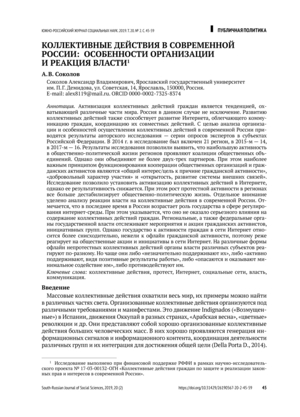Аннотация
Активизация коллективных действий граждан является тенденцией, охватывающей различные части мира. Россия в данном случае не исключение. Развитию коллективных действий также способствует развитие Интернета, облегчающего коммуникацию граждан, координацию их совместных действий. С целью анализа организации и особенностей осуществления коллективных действий в современной России приводятся результаты авторского исследования — серии опросов экспертов в субъектах Российской Федерации. В 2014 г. в исследование был включен 21 регион, в 2015-м — 14, в 2017-м — 16. Результаты исследования позволили выявить, что наибольшую активность в общественно-политической жизни регионов проявляют коалиции общественных объединений. Однако они объединяют не более двух-трех партнеров. При этом наиболее важным принципом функционирования кооперации общественных организаций и гражданских активистов являются «общий интерес/цель к причине гражданской активности», «добровольный характер участия» и «открытость, развитие системы внешних связей». Исследование позволило установить активизацию коллективных действий в Интернете, однако ее результативность снижается. При этом рост протестной активности в регионах все больше дестабилизирует общественно-политическую жизнь. Отдельное внимание уделено анализу реакции власти на коллективные действия в современной России. Отмечается, что в последнее время в России возрастает роль государства в сфере регулирования интернет-среды. При этом указывается, что оно не оказало серьезного влияния на содержание коллективных действий граждан. Региональные, а также федеральные органы государственной власти отслеживают мероприятия и акции гражданских активистов, инициативных групп. Однако государство к активности граждан в сети Интернет относится более снисходительно, нежели к офлайн гражданской активности, поэтому реже реагирует на общественные акции и инициативы в сети Интернет. На различные формы офлайн непротестных коллективных действий органы власти различных субъектов реагируют по-разному. Но чаще они либо «незначительно поддерживают их», либо «активно поддерживают, видя позитивные результаты работы», либо «опасаются и оказывают минимальное содействие им», либо противодействуют им.
Ключевые слова
Информация о финансировании
Исследование выполнено при финансовой поддержке РФФИ в рамках научно-исследовательского проекта № 17-03-00132-ОГН «Коллективные действия граждан по защите и реализации законных прав и интересов в современной России».
Библиографические ссылки
Boulianne, S. (2009). Does Internet Use Affect Engagement? A Meta-Analysis of Research. Political Communication, 26 (2), 193–211.
Brady, H., Verba, S., Schlozman, K. L. (1995). Beyond Ses: A Resource Model of Political Participation. American Political Science Review, 89 (2), 271-294.
Cho, J., Shah, D. V., McLeod, J. M., McLeod, D. M., Scholl, R. M., Gotlieb, M. R. (2009). Campaigns, Reflection, and Deliberation: Advancing an O-S-R-O-R Model of Communication Effects. Communication Theory, 19 (1), 66-88.
Cohen, C., Kahne, J. (2012). Participatory Politics: New Media and Youth Political Action. Chicago: MacArthur Research Network on Youth and Participatory Politics.
Curran, J. (2005) Mediations of Democracy. In Curran, J., Gurevitch, M. (eds.) Mass Media and Society (pp. 122–149). New York: Oxford University Press.
Della Porta, D. (2014). Comment on Organizing in the Crowd. Information, Communication & Society, 17 (2). 269–271.
Diani, M. (2000). Social Movement Networks Virtual and Real. Information, Communication and Society, 3, 386–401.
Earl, J., Kimport, К. (2011). Digitally Enabled Social Change. Cambridge and London: The MIT Press.
Filatova, O. G. (2000). Metodika i tekhnika sotsiologicheskogo issledovaniya: Konspekt lektsiy [Methods and Techniques of Sociological Research: Summary of the Lectures]. SPb: Izdatel’stvo Mikhaylova V. A.
Friedman, D., McAdam, D. (1992). Collective Identity and Activism. Networks, Choices and the Life of a Social Movement. In A. D. Morris, C. M. Mueller (eds.) Frontiers in Social Movement Theory (pp. 156–172). New Haven, CT: Yale University Press.
Horrigan, J., Garrett, K., Resnick, P. (2004). The Internet and Democratic Debate. Pew Internet and American Life Project.
Kavada, A. (2009). Email Lists and the Construction of an Open and Multifaceted Identity. Information, Communication and Society, 12, 817–839.
Kupryashin, G. L., et al. (1996). Vvedenie v politologiyu: slovar’-spravochnik [Introduction into Political Science: a Reference Book]. M.: Aspekt Press.
Maksimova, Ye. N. (2013). Politicheskiy protest kak faktor nestabil’nosti politicheskoy sistemy [Political Protest as Political System Instability Factor]. Istoricheskiye, filosofskiye, politicheskiye i yuridicheskiye nauki, kul’turologiya i iskusstvovedeniye. Voprosy teorii i praktiki [Historical, Philosophical, Political and Legal Sciences, Cultural Studies and Art History. Questions of Theory and Practice], 3 (29), 105–108.
McAdam, D., McCarthy J. D., Zald, M. N. (1996). Comparative Perspectives and Social Movements: Political Opportunities, Mobilizing Structures, and Cultural Framing. New York: Cambridge University Press.
McCurdy, P. (2012). Social Movements, Protest and Mainstream Media. Sociology Compass Blackwell Publishing, 6 (3), 244–255.
Medina, L. F. (2007). A Unified Theory of Collective Action and Social Change, Analytical Perspectives on Politics. Ann Arbor: University of Michigan Press.
Palfrey, J., Gasser, U. (2008). Born Digital: Understanding the First Generation of Digital Natives. New York: Basic Books.
Pustoshinskaya, O. S. (2014). Kategoriya “politicheskiy protest”: osmysleniye s pozitsii dialektiki i skvoz’ prizmu kontseptualizatsii [“Political Protest” Category: Comprehension From Dialectics Position and in the Light of Conceptualization]. Istoricheskiye, filosofskiye, politicheskiye i yuridicheskiye nauki, kul’turologiya i iskusstvovedeniye. Voprosy teorii i praktiki [Historical, Philosophical, Political and Legal Sciences, Cultural Studies and Art History. Questions of Theory and Practice], 1 (39), 185–188.
Shirky, C. (2008). Here Comes Everybody: The Power of Organizing Without Organizations. New York: Penguin Press.
Stekelenburg van, J., Klandermans, B. (2010). Individuals in Movements: A Social Psychology of Contention. In B. Klandermans and C. Roggeband (eds.) Handbook of Social Movements Across Disciplines (pp. 157–205). New York: Springer.
Tufekfi, Z. (2014). Capabilities of Movements and Affordances of Digital Media: Paradoxes of Empowerment. Retrieved from http://dmlcentral.net/blog/zeynep-tufekci/capabilities-movements-and-affordances-digital-media-paradoxes-empowerment.


